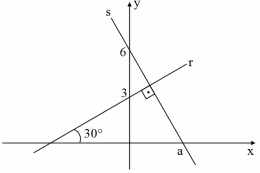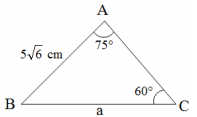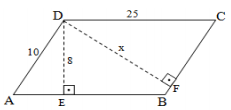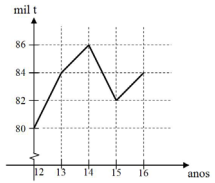Questões Militares
Comentadas para eear
Foram encontradas 4.974 questões
Resolva questões gratuitamente!
Junte-se a mais de 4 milhões de concurseiros!
Os pontos A(2, 2), B(5, 6) e C(8, 1) são os vértices de um
triângulo; os pontos D e E são pontos médios, respectivamente, de  e
e  , e o ponto G é a intersecção de
, e o ponto G é a intersecção de  . Assim, as
coordenadas de G são
. Assim, as
coordenadas de G são
O sistema  , quanto a sua solução, é classificado como
, quanto a sua solução, é classificado como
Considerando as retas r e s da figura, o valor de a é

Os pontos O e P são os centros de duas circunferências que
possuem raios medindo, respectivamente, 8 cm e 3 cm, conforme a
figura. Se OP = 5√37 cm e se  é tangente a essas
circunferências, em A e B, então AB = ______ cm.
é tangente a essas
circunferências, em A e B, então AB = ______ cm.

Considerando a figura e que sen75° é igual a  ,
calcula-se que a = 5 ( _____ ) cm.
,
calcula-se que a = 5 ( _____ ) cm.

Na figura, se ABCD é um paralelogramo, então o valor de x é

Uma circunferência de 5 cm de raio possui duas cordas
AB = 6 cm e BC = x cm. Se  é perpendicular a
é perpendicular a  , então x é
igual a
, então x é
igual a
O gráfico representa, em milhares de toneladas, a produção no Estado de São Paulo de um determinado produto agrícola, entre os anos de 2012 e 2016. Analisando o gráfico, observa-se que a produção

Mandela
Nelson Mandela has achieved many things, but his greatest influence may be for something he didn’t do: run for a second term as South Africa’s leader. As the first President of a post-apartheid South Africa, he was, like George Washington, aware that everything he did would be a model for those who would follow. He once said, “I don’t want to be an octogenarian President.”
What he really meant was that no man - not even one unfairly imprisoned for 27 years - should be above the law or the people. Mandela will remain perhaps the only figure on the world stage who has been an unambiguous moral giant. He could be considered a hero precisely because he always admitted his errors and then tried to rise above them. And never stop learning. He had to catch up on almost three decades of social change, and one of the things he had to learn about was AIDS. At first, this man didn’t have the most enlightened view. But within a year-long before other, younger South African leaders - he understood that AIDS was an enormous tragedy for his country and his continent, and he saw it as another moral challenge in a life of facing up to them. That’s a moral leadership.
Adapted from Grad Two
According to the text, we can infer that Mandela _______________. EXCEPT:
Mandela
Nelson Mandela has achieved many things, but his greatest influence may be for something he didn’t do: run for a second term as South Africa’s leader. As the first President of a post-apartheid South Africa, he was, like George Washington, aware that everything he did would be a model for those who would follow. He once said, “I don’t want to be an octogenarian President.”
What he really meant was that no man - not even one unfairly imprisoned for 27 years - should be above the law or the people. Mandela will remain perhaps the only figure on the world stage who has been an unambiguous moral giant. He could be considered a hero precisely because he always admitted his errors and then tried to rise above them. And never stop learning. He had to catch up on almost three decades of social change, and one of the things he had to learn about was AIDS. At first, this man didn’t have the most enlightened view. But within a year-long before other, younger South African leaders - he understood that AIDS was an enormous tragedy for his country and his continent, and he saw it as another moral challenge in a life of facing up to them. That’s a moral leadership.
Adapted from Grad Two
Mandela
Nelson Mandela has achieved many things, but his greatest influence may be for something he didn’t do: run for a second term as South Africa’s leader. As the first President of a post-apartheid South Africa, he was, like George Washington, aware that everything he did would be a model for those who would follow. He once said, “I don’t want to be an octogenarian President.”
What he really meant was that no man - not even one unfairly imprisoned for 27 years - should be above the law or the people. Mandela will remain perhaps the only figure on the world stage who has been an unambiguous moral giant. He could be considered a hero precisely because he always admitted his errors and then tried to rise above them. And never stop learning. He had to catch up on almost three decades of social change, and one of the things he had to learn about was AIDS. At first, this man didn’t have the most enlightened view. But within a year-long before other, younger South African leaders - he understood that AIDS was an enormous tragedy for his country and his continent, and he saw it as another moral challenge in a life of facing up to them. That’s a moral leadership.
Adapted from Grad Two